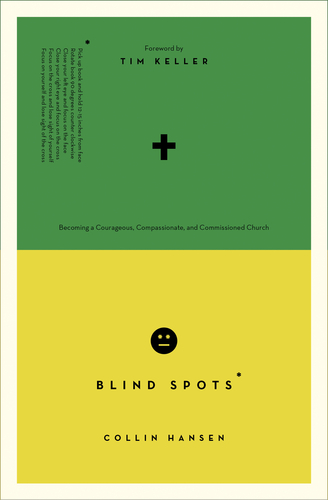This excerpt is taken from Collin Hansen’s new book, Blind Spots: Becoming a Courageous, Compassionate, and Commissioned Church (Crossway, 2015).
The only kind of courage that will sustain us in truth and love comes from our identity as sinners saved by grace. When you forget that you need your courageous, prophetic message about Jesus as much or more than anyone else, your courage appears to others as mere arrogance.
Courage to repeat the same old failed approaches is foolishness. Being hated by the world doesn’t necessarily prove you’re courageous. You speak boldly about marriage and abortion. Good! Now devote the same courage to fighting racism and averting war. The church has not always done so, and the consequences have been devastating for both the church and the world. Don’t be surprised if the world prefers a bad solution when we offer no solution.
Courage is more than countering the culture, more than saying no to the world. We pray for those who persecute us. We love our enemies. We seek their prosperity, now and especially forevermore. But if they can’t see the compassion in our courageous stands, we appear to them as just another power-grabbing interest group. If you don’t communicate in a way your neighbors can hear, you may not love them so much as you enjoy the satisfaction of rejection. Courage may in fact be your blind spot.
Courage to repeat the same old failed approaches is foolishness.
Consider this: what have you done to make your church a welcoming place for neighbors not like you? You may criticize churches that have adopted the cultural idiom and downplayed the fear of God. But invite your neighbors who don’t normally attend church and see your church service through their eyes. What isn’t explained? Who isn’t introduced? What words need translation? Remember, we want unbelievers to contend with the foolishness of the cross, not our religious jargon. If they leave confused, don’t pat yourself on the back thinking, They just can’t handle the truth.

Let’s get even more personal. What sins are publicly confessed in your church? Consult a list such as Galatians 5:19–21. Maybe your church talks often about sins such as sensuality. Do you also seek forgiveness for strife? Envy? Rivalry? We cannot simply dismiss the world’s dismal view of the church as evidence that we’re living faithfully for Jesus. Outsiders see our churches as more than content to baptize a conservative utopia where government punishes other people’s sins and doesn’t touch our freedom, consumerism, and inequality. They think we’re in it for ourselves. They don’t see Christianity as caring for the world. They don’t see how faith in Jesus makes any difference for everyday problems such as lack of access to quality education and job opportunities. We talk about religious freedom, and they hear us pleading for special privileges. We talk about conversion, and they hear us recruiting new Republican voters. We talk about courage, and they hear us pining for the black-and-white 1950s.
Pessimism and retreat will not suffice.
If you’re like me, you typically blame the world for not understanding. That’s a blind spot for us. You’re tempted to say good riddance to a world that has always rejected the prophets and suppressed the conscience in sin. Claiming to be wise, the ungodly exchange the glory of the immortal God for idols and become fools (Rom. 1:22–23). And to some degree, you’re right. We don’t expect the world will necessarily recognize our courage as love. We know that genuine compassion is not possible apart from courage to defend biblical doctrine. In sin the world rages against the heavenly Father, even though he always knows best. That’s the biggest problem with working toward the “common good,” as nice as that phrase sounds. What if the world doesn’t want what is good for them?
Unfortunately, when opposed by the world, we courageous Christians tend to succumb to pessimism. We defend the doctrines of grace without grace and confuse rejection of us with rejection of Jesus. But Jesus didn’t give up on his foolish disciples. He even forgave his murderers from the cross. And he didn’t give up on you and me in our sin. So pessimism doesn’t make us heroic.
Courage that counts makes you faithful in whatever place and position God has given you. This courage makes you fervent in spirit, patient in tribulation, and constant in prayer as you serve the Lord with zeal, always rejoicing in his sure hope (Rom. 12:11–12). And the challenges we face in a changing world will weed out all but the fervent, patient, constant, and rejoicing Christians. Pessimism and retreat will not suffice.
Is there enough evidence for us to believe the Gospels?
 In an age of faith deconstruction and skepticism about the Bible’s authority, it’s common to hear claims that the Gospels are unreliable propaganda. And if the Gospels are shown to be historically unreliable, the whole foundation of Christianity begins to crumble.
In an age of faith deconstruction and skepticism about the Bible’s authority, it’s common to hear claims that the Gospels are unreliable propaganda. And if the Gospels are shown to be historically unreliable, the whole foundation of Christianity begins to crumble.



































